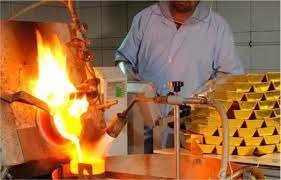Locker Manager
SECTOR: GEMS & JEWELLERY
SUB-SECTOR: Handmade gold and gems-set jewellery
OCCUPATION: Inventory Management
REFERENCE ID: G&J/Q0302
ALIGNED TO: NCO-2004/ NIL
Locker Manager: The Locker Manager is responsible for keeping track of
jewellery samples and finished jewellery that is pending dispatch or is unsold.
Brief Job Description: The individual maintains records of all types of valuable
inventory, including raw material, intermediate material under process, finish or
pending completions, finished product, samples / repairs that is stored in the
lockers or safes under the individual’s supervision either for future use or
pending sale or awaiting refining and melting. The individual is responsible for
keeping track of entry and exit of all valuables stored in vaults, safes or lockers
or boxes.
Personal Attributes: The job requires the individual to have: sense of security;
attention to details and ability to work on computers for long hours. The
individual must also be able to use reflective skills in order to develop improved
inventory management for the valuables.
Unit Code G&J/N0302
Unit Title
(Task) Manage the vaults and lockers, keep records and maintain security standards
Description This OS unit is about taking care of valuables of the company such as unsold jewellery,
jewellery pending sale, patented and other physical design bank, jewellery masters
and samples – that are kept in vaults and lockers; maintaining records of their
movement; and securing their safety
Scope This unit/task covers the following:
Manage vaults or lockers
Keep records of inventory
Maintain accessibility and safety of inventory
Report problems
Managing vaults and
lockers
To be competent, the user/individual on the job must be able to:
PC1. check quantity of inventory, in weight or number of pieces as specified
PC2. check raw material including gold bars, components
PC3. stock finished jewellery awaiting sale or dispatch
PC4. stock all inventory under process or work, and anything which has to be stored
overnight between work shifts
PC5. stock master jewellery and prototype jewellery
PC6. stock any scrap / rejections pending recycling / refining
PC7. stock jewellery returned for repairs and pending processing or delivery
PC8. store the designs, masters and jewellery as prescribed by the company
PC9. conduct regular and physical audits to check regularly for safety
PC10. use colour coding and/or bar coding for easy identification of stored content
PC11. follow strictly, the company’s security precautions and standards
PC12. follow-up or report any discrepancies in records versus physical inventory
PC13. keep all valuables labelled and safe
PC14. keep records of all types of valuable items in the vaults and lockers in terms of
product details, entry and exit dates and users involved
PC15. maintain tight security
PC16. conduct regular audit of physical inventory
To be competent, the user/individual on the job must be able to:
PC17. record all source and destination identifiers, such as karigar, process,
department, branch, location, physical address , customer’s details such as
name, contact person and details for jewellery pending sale
PC18. record workflow process handovers
PC19. maintain a log of access to valuables storage area either manually or in an
automated system
PC20. record design or master or jewellery details such as from catalogue or design
bank or fresh, design number or model number, product type, e.g., necklace,
bangle
PC21. record detailing such as size and weight of gold and stones
PC22. record type of manufacturing process, i.e., from casting or handmade
PC23. record additional information such as Rhodium plated or enamel painted or
embossed
PC24. record name of person and department issued to or received from and date of
receipt or issue
PC25. record delivery due date and number of jewellery pending sale
Handling problems To be competent, the user/individual on the job must be able to:
PC26. report information system / equipment failure
PC27. report any mismatch in description of jewellery issued or received
PC28. inform about problems in tracking the inventory
PC29. report difficulty in delivering on schedule
PC30. detect and report any discrepancies
A. Organizational
Context
(Knowledge of the
company /
organization and
its processes)
The individual on the job needs to know and understand:
KA1. company’s policies on: delivery timelines; safety and hazards; integrity; and
personnel management
KA2. work flow involved in company’s jewellery manufacturing process
KA3. importance of the individual’s role in the workflow
KA4. reporting structure
B. Technical
Knowledge
The user/individual on the job needs to know and understand:
KB1. the different types of jewellery available with the company
KB2. terminologies used in jewellery manufacturing, both local and global
KB3. record keeping, colour coding, and/or bar coding
KB4. Status of valuables in store at any point in time
Skills (S) [Optional]
A. Core Skills/
Generic Skills
Basic reading and typing skills
The user/individual on the job needs to know and understand how:
SA1. to read inventory labels and descriptions
SA2. keep record on paper or computer
Communication skills
The user/individual on the job needs to know and understand how:
SA3. to communicate effectively with seniors and colleagues
The user/individual on the job needs to know and understand how:
SB1. to use software for generating inventory data
SB2. to use MS Office tools for writing and recording
SB3. to import photograph in data bank and match
Decision making
The user/individual on the job needs to know and understand how:
SB4. to inform seniors about any mismatch
Unit Code G&J/N9910
Unit Title
(Task) Respect IPR of company as well as competitors
Description This OS unit is about maintaining company’s IPR and avoiding infringement on
copyright of others
Scope This unit/task covers the following:
Protect company’s Intellectual Property Rights (IPR)
Avoid infringement to copyright of other companies
Performance Criteria(PC) w.r.t. the Scope
Element Performance Criteria
Respecting IPR To be competent, the user/individual on the job must be able to:
PC1. prevent leak of new designs to competitors by reporting on time
PC2. spot any infringement of company’s product or design patents
PC3. report IPR violations observed in the market, to supervisor or company heads
PC4. read copyright clause of the material published on the internet and any other
printed material
PC5. consult supervisor or senior management when in doubt about using publicly
available information
PC6. report any infringement observed in the company
PC7. spot plagiarism and report
PC8. understand rationale of patents and IPR
PC9. avoid being involved in IPR violations
Knowledge and Understanding (K)
A. Organizational
Context
The individual on the job needs to know and understand:
KA1. company’s policies on IPR, plagiarism and order leaks
KA2. company’s patented products
KA3. market trends and company’s unique product range
KA4. reporting structure
B. Technical
Knowledge
The individual on the job needs to know and understand:
KB1. basics of patents and IPR laws
KB2. how IPR protection is important for competitiveness of a company
Skills (S) [Optional]
A. Core Skills/
Generic Skills
Communication skills
The user/individual on the job needs to know and understand how:
SA1. to effectively communicate any observed IPR violations or design leaks
B. Professional Skills Decision making
The user/individual on the job needs to know and understand when and how:
SB1. to report sources of IPR violations
National Occupational Standard
G&J/ N 9910 Maintain IPR and respect copyright
10
Reflective thinking
The user/individual on the job needs to know and understand how:
SB2. to learn from past mistakes and report IPR violations on time
Critical thinking
The user/individual on the job needs to know and understand how:
SB3. to spot signs of violations and alert authorities in time
Unit Code G&J/N9913
Unit Title
(Task) Interact with colleagues and team members
Description This OS unit is about communicating with colleagues and seniors in order to maintain
smooth and hazard-free work flow
Scope This unit/task covers the following:
Interact with Seniors, Production Manager and others
Interact with colleagues
Performance Criteria(PC) w.r.t. the Scope
Element Performance Criteria
Interaction with
seniors
To be competent, the user/individual on the job must be able to:
PC1. receive or give work-flow instructions and quality standards
PC2. communicate about process flow improvements
PC3. communicate any potential hazards or expected disruptions
PC4. understand the work output requirements
PC5. comply with company policy and rule
PC6. deliver quality work on time as required by reporting any anticipated reasons
for delays
Interactions with
colleagues and other
departments
To be competent, the user/individual on the job must be able to:
PC7. work as a team with colleagues and seniors
PC8. share skills and train
PC9. communicate and discuss work flow related difficulties in order to find
solutions with mutual agreement
PC10. receive feedback and address concerns in order to complete work on time
PC11. put team over individual goals
PC12. resolve conflicts and multi-task
Knowledge and Understanding (K)
A. Organizational
Context
(Knowledge of the
company /
organization and
its processes)
The individual on the job needs to know and understand:
KA1. company’s policies on personnel management
KA2. work flow involved in company’s jewellery manufacturing process
KA3. importance of the individual’s role in the workflow
KA4. reporting structure
B. Technical
Knowledge
The individual on the job needs to know and understand:
KB1. how to communicate effectively
KB2. how to build team coordination
Skills (S) [Optional]
A. Core Skills/ Teamwork and some multitasking
The individual on the job needs to know and understand how:
SA1. to motivate team to work
SA2. to convince seniors about significant process changes
SA3. to share work load as required
SA4. to deliver product to next work process on time
B. Professional Skills Decision making
The individual on the job needs to know and understand:
SB1. how to report potential areas of disruptions to work process
SB2. when to report to senior and when to deal with a colleague depending on the
type of concern
Reflective thinking
The individual on the job needs to know and understand:
SB3. how to improve work process
Critical thinking
The individual on the job needs to know and understand:
SB4. how to spot process disruptions and delays
G&J/N9914
Unit Title
(Task) Work towards having a safe work environment
Description This OS unit is about being aware of and communicating potential hazards and
dangers of accidents on the job
Scope This unit/task covers the following:
Understand potential sources of accidents
Communicate to reporting supervisor about hazards in time
Performance Criteria(PC) w.r.t. the Scope
Element Performance Criteria
Understanding of
potential sources of
accidents and
communicating
To be competent, the user/individual on the job must be able to:
PC1. avoid accidents related to use of potentially dangerous chemicals, gas torches,
sharp tools and hazards from machines
PC2. suggest process flow improvements to reduce anticipated or repetitive hazards
PC3. report mishandling of tools, machines or hazardous materials
PC4. identify electrical problems that could result in accident
PC5. spot and report potential hazards on time
PC6. follow company policy and rules regarding hazardous materials
PC7. deliver quality work on time as required by reporting any anticipated reasons
for delays
Knowledge and Understanding (K)
A. Organizational
Context
(Knowledge of the
company /
organization and
its processes)
The individual on the job needs to know and understand:
KA1. company’s policies on handling: harmful chemicals and sharp tools, safety and
hazards of machines, fire safety and, disposal of harmful chemicals and
materials
KA2. work flow involved in company’s jewellery manufacturing process
KA3. importance of the individual’s role in the workflow
KA4. reporting structure
B. Technical
Knowledge
The individual on the job needs to know and understand:
KB1. how different chemicals react and what could be the danger from them
KB2. how to use machines and tools without causing bodily harm
KB3. fire safety education
KB4. disposal of hazardous chemicals, tools and materials by following prescribed
environmental norms or as per company policy
Skills (S) [Optional]
A. Core Skills/
Generic Skills
Communication skills
The individual on the job needs to know and understand how:
SA1. to effectively communicate the danger
The individual on the job needs to know and understand:
SB1. importance of reporting potential sources of danger
SB2. appropriate actions to be taken in the event of an accident
SB3. process for disposing of hazardous materials, safely and following
environmental guidelines
Reflective thinking
The individual on the job needs to know and understand how:
SB4. to learn from past mistakes regarding use of hazardous machines or
chemicals or gas torches
Critical thinking
The individual on the job needs to know and understand:
SB5. how to spot danger
SB6. procedures to follow in the event of a fire or other hazard
Keywords /Terms Description
Sector Sector is a conglomeration of different business operations having similar
business and interests. It may also be defined as a distinct subset of the
economy whose components share similar characteristics and interests.
Sub-sector Sub-sector is derived from a further breakdown based on the
characteristics and interests of its components.
Occupation Occupation is a set of job roles, which perform similar/ related set of
functions in an industry.
Function Function is an activity necessary for achieving the key purpose of the
sector, occupation, or an area of work, which can be carried out by a
person or a group of persons. Functions are identified through functional
analysis and form the basis of OS.
Sub-function Sub-functions are sub-activities essential to fulfil the achieving the
objectives of the function.
Job role Job role defines a unique set of functions that together form a unique
employment opportunity in an organisation.
Occupational Standards
(OS)
OS specify the standards of performance an individual must achieve
when carrying out a function in the workplace, together with the
knowledge and understanding they need to meet that standard
consistently. Occupational Standards are applicable both in the Indian
and global contexts.
Performance Criteria Performance criteria are statements that together specify the standard of
performance required when carrying out a task.
National Occupational
Standards (OS)
NOS are occupational standards which apply uniquely in the Indian
context.
Qualifications Pack (QP) QP comprises the set of OS, together with the educational, training and
other criteria required to perform a job role. A QP is assigned a unique
qualifications pack code.
Unit Code Unit code is a unique identifier for an Occupational Standard, which is
denoted by an ‘N’
Unit Title Unit title gives a clear overall statement about what the incumbent
should be able to do.
Description Description gives a short summary of the unit content. This would be
helpful to anyone searching on a database to verify that this is the
appropriate OS they are looking for.
Scope Scope is a set of statements specifying the range of variables that an
individual may have to deal with in carrying out the function which have
a critical impact on quality of performance required.
Knowledge and
Understanding
Knowledge and understanding are statements which together specify the
technical, generic, professional and organisational specific knowledge
that an individual needs in order to perform to the required standard.
Organisational Context Organisational context includes the way the organisation is structured
and how it operates, including the extent of operative knowledge
managers have of their relevant areas of responsibility.
Technical Knowledge Technical knowledge is the specific knowledge needed to accomplish
specific designated responsibilities.
Core Skills/ Generic
Skills
Core skills or generic skills are a group of skills that are the key to learning
and working in today’s world. These skills are typically needed in any
work environment in today’s world. These skills are typically needed in
any work environment. In the context of the OS, these include
communication related skills that are applicable to most job roles.
Keywords /Terms Description
IPR Intellectual Property Rights
NOS National Occupational Standard(s)
NVQF National Vocational Qualifications Framework
NSQF National Qualifications Framework
NVEQF National Vocational Education Qualifications Framework
QP Qualifications Pack
CRITERIA FOR ASSESSMENT OF TRAINEES
Job Role Locker Manager
Qualification Pack Locker Manager
Sector Skill Council GEMS & JEWELLERY
To pass the Assessment, a candidate needs to score 50% in Theory and 70% in Practical
Assessment Strategy Marks Allocation
NOS Elements Performance Criteria Theory Practical
- G&J/N0302 Manage
vaults and lockers and
keep records
Managing vaults and lockers
PC1.keep all valuables labelled and safe 4 16
PC2.keep records of all types of valuable items in the vaults and lockers
in terms of product details, entry and exit dates and users involved 3 16
PC3.maintain tight security 2 14
PC4.conduct regular audit of physical inventory 2 14
Handling problems PC5.detect and report any discrepancies 1 10
Sub Total 12 70 - G&J/N9910 Maintain IPR
and respect copyright
Respecting IPR
IPR
PC1. Spot plagiarism and report 0 1
PC2. understand rationale of patents and IPR 0 1
PC3. avoid being involved in IPR violations 0 1
Sub Total 0 3 - G&J/N9913 Interact
with colleagues and team
Interaction with
supervisor
PC1. Understand the work output requirements 1 2
PC2. Understand company policy and rule 1 1
PC3. Deliver quality work on time as required by reporting any
anticipated reasons for delays 0 1
Interactions with
colleagues and other
departments
PC4. Put team over individual goals 0 0
PC5. Conflicts resolution and multi-tasking 0 1
Sub Total 2 5 - G&J/N9914 Maintain
safe work environment
Understanding of potential
sources of accidents and
communicating
PC1. Spot and report potential hazards on time 2 1
PC2. Follow company policy and rules regarding use of hazardous
materials 1 0
PC3. Deliver quality work on time as required by reporting any
anticipated reasons for delays 3 1
Sub Total 6 2
Total 20 80








